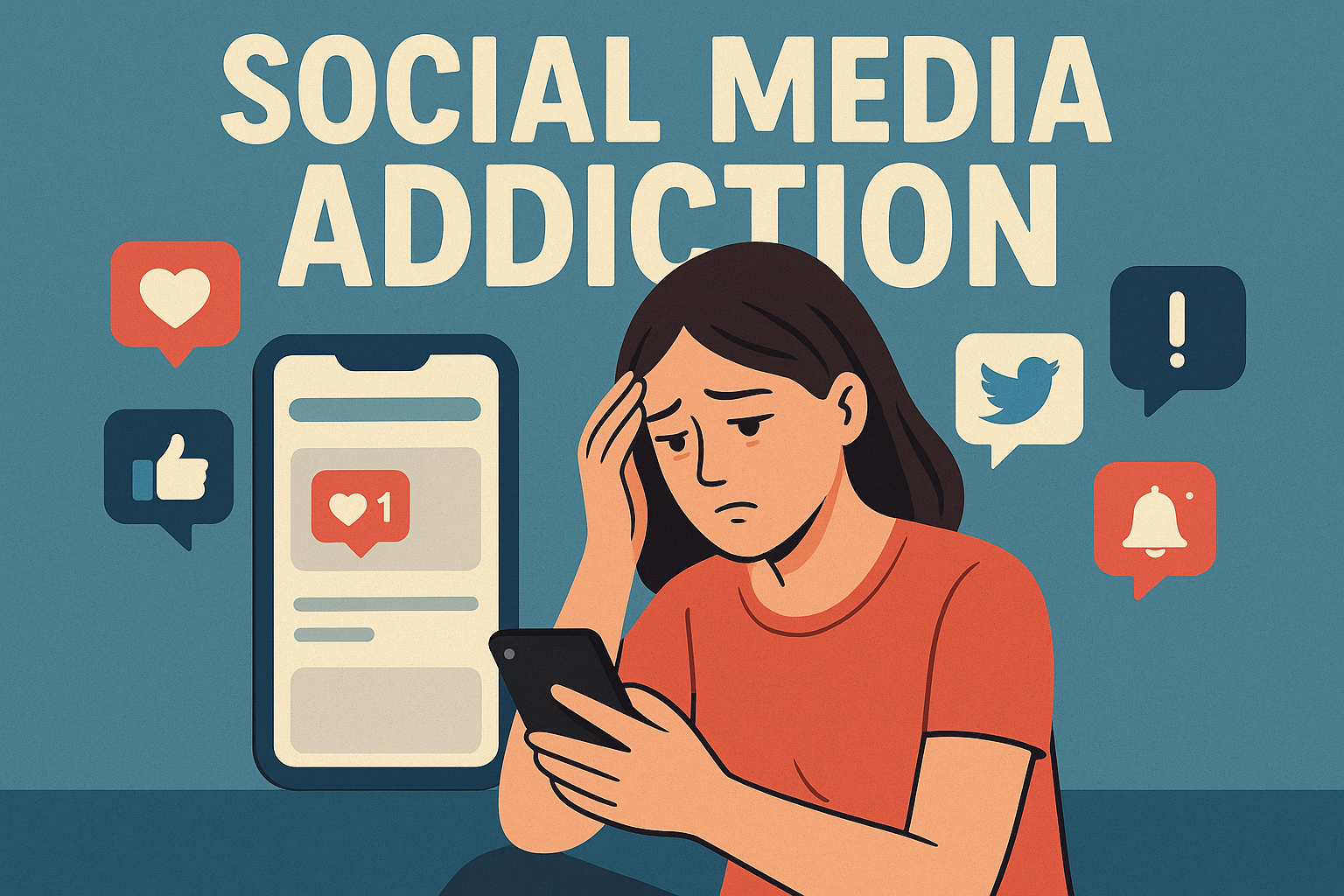Introduction
In today’s hyperconnected world, social media has become a vital part of our daily lives. From staying in touch with friends to exploring trends and building businesses, platforms like Instagram, Facebook, TikTok, and X (formerly Twitter) have transformed communication. However, the constant urge to scroll, post, and engage has given rise to a serious problem — social media addiction. This digital dependency is silently affecting millions across the globe, influencing mental health, productivity, and real-life relationships.
What is Social Media Addiction?
Social media addiction refers to the compulsive and excessive use of social networking platforms to the point where it begins to interfere with personal, academic, or professional life. Much like substance abuse, this behavioral addiction is driven by the brain’s reward system — every like, comment, or notification triggers a dopamine release, making users crave more engagement. Over time, this cycle can lead to emotional dependence, anxiety, and even withdrawal symptoms when offline.
Causes of Social Media Addiction
- Dopamine-Driven Rewards:
Social media platforms are designed to keep users hooked. The instant gratification of receiving likes or messages releases dopamine, a chemical associated with pleasure and reward. This makes users return repeatedly, seeking validation and excitement. - Fear of Missing Out (FOMO):
The fear of missing updates, events, or trending content drives many to constantly check their feeds. This FOMO creates a psychological need to stay connected 24/7. - Social Validation:
In a world where online presence defines popularity, people often rely on social media for self-worth. The desire for approval and comparison with others’ curated lives fuels overuse. - Escapism:
Many turn to social media as an escape from reality, using it to cope with stress, loneliness, or boredom — a temporary relief that eventually turns into dependency.
Effects of Social Media Addiction
- Mental Health Decline:
Prolonged use of social media can lead to anxiety, depression, and low self-esteem. Constant exposure to idealized lifestyles causes comparison and dissatisfaction with one’s own life. - Sleep Disruption:
Late-night scrolling interferes with natural sleep patterns. Blue light exposure reduces melatonin production, making it harder to fall asleep and leading to fatigue and irritability. - Reduced Productivity:
Addiction to social media can distract users from important tasks. Students struggle with focus, and employees often experience reduced efficiency due to constant notifications and multitasking. - Physical Health Problems:
Sedentary behavior, poor posture, eye strain, and headaches are common among heavy users. Over time, these habits can lead to serious health issues. - Relationship Strain:
When virtual interactions take precedence over real ones, relationships suffer. People become more emotionally detached and less present in real-life conversations.
Recognizing the Signs of Social Media Addiction
If you find it hard to put down your phone or constantly check for updates, you might be at risk. Key warning signs include:
- Feeling anxious when unable to access social media.
- Losing track of time while scrolling.
- Neglecting responsibilities or personal interactions.
- Comparing your life constantly with others online.
- Feeling low or restless when not online.
How to Overcome Social Media Addiction
- Set Time Limits:
Allocate specific hours for social media use and stick to them. Use tools like screen time trackers to monitor your daily usage. - Turn Off Notifications:
Disable non-essential alerts. This helps reduce distractions and lessens the urge to check updates every few minutes. - Take Digital Detox Breaks:
Dedicate one day each week to go offline. Engage in outdoor activities, hobbies, or real conversations to reconnect with yourself and others. - Mindful Consumption:
Follow accounts that promote positivity and growth. Avoid toxic content that triggers comparison or negativity. - Seek Support:
If social media use starts affecting your health or work, consider speaking to a counselor or joining a support group focused on digital wellness.
Conclusion
Social media is a powerful tool when used wisely — it connects, informs, and inspires. However, when overused, it can harm mental health and disrupt real-life balance. The key lies in moderation and mindful usage. By setting boundaries and prioritizing real-world interactions, we can enjoy the benefits of technology without falling into the trap of social media addiction. Remember, it’s not about quitting completely; it’s about regaining control over your time, attention, and peace of mind.

